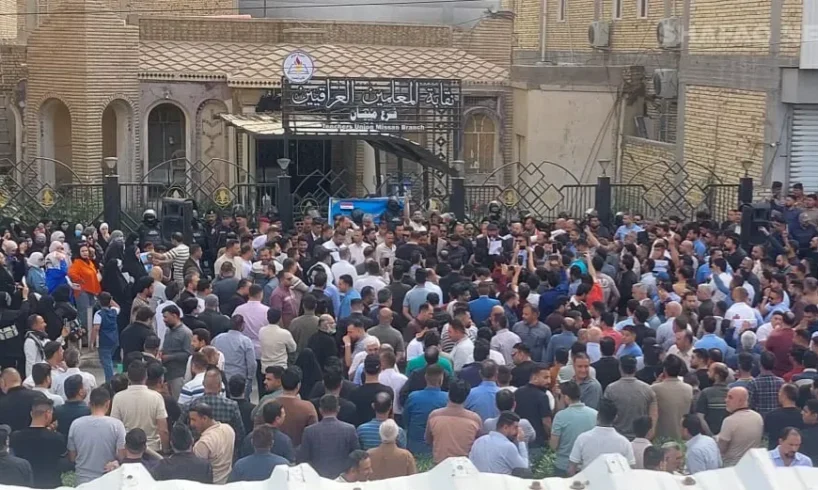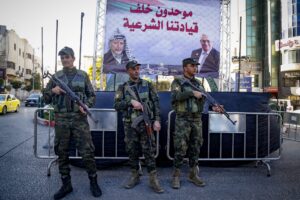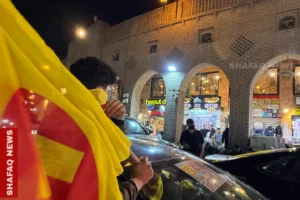
2025-11-19T10:29:05+00:00
font
Enable Reading Mode
A-
A
A+
Shafaq News
Iraq’s teachers and education staff are preparing for nationwide protests after the Ministry of Finance refused to release a 150,000-dinar (roughly $103) allowance for every teacher previously approved by the parliament. The ministry cited a lack of liquidity, a consequence of global oil price fluctuations and borrowing to cover salaries.
The decision affects one of Iraq’s largest public-sector workforces. In 2023, official figures counted around 750,000 teachers and education staff, while a 2024 World Bank estimate placed 467,536 personnel in public pre-university institutions.
The law granting the increase followed widespread protests and sit-ins last April, when teachers demanded better pay and support. A member of the Parliamentary Finance Committee, speaking anonymously to Shafaq News, indicated that the government had opposed the bill from the outset but delayed formal rejection until after the recent elections.
“The allowance is a legitimate right for teachers, who are essential in preparing Iraq’s future generations,” the member stressed.
Chronic Salary Squeeze
This strain is not new. Iraq’s education system has faced repeated salary freezes, delayed payments, and stalled promotions, with some regions suspending raises as far back as 2016. Teachers across Baghdad, Basra, and other provinces have staged protests multiple times, including nationwide strikes in 2024 involving over 1.2 million educators demanding better pay, career progression, and professional allowances.
Newly appointed teachers earn around 400,000 dinars (approximately $275) per month, while those with more than 20 years of service receive between 700,000 and 900,000 dinars (roughly $482–$620). Some contract or newly hired teachers earn as little as 300,000 dinars (about $206), highlighting the disparities across the sector.
Teacher Maytham Abd al-Razzaq emphasized that “Once the law is passed and ratified, it is binding,” adding that parliament’s approval followed a careful review rather than sentiment. She highlighted that contradictions between the legislature and the executive undermine confidence in both institutions.
Teacher Abd al-Ridha Hassan Ali described the ongoing disputes as part of a decades-long structural crisis in Iraq’s education sector, underscoring that the open-ended sit-in remains the only way to compel the ministry to release the 150,000-dinar (around $103) allowance.
Parliamentary Hurdles
Meanwhile, MP Zlikha Elias al-Bakkar, from the Al-Hasm Movement and a member of the Parliamentary Education Committee, explained that the law passed with difficulty, as some MPs deliberately left the chamber to break quorum.
Stressing that her Committee would monitor implementation of parliament’s decision, she noted that payments might not be made until next year due to the absence of an approved budget, placing further responsibility on the next parliament.
Open-Ended Sit-Ins
The Ministry of Finance’s refusal triggered the Teachers’ Syndicate to announce plans for protests across Baghdad and other provinces, including an open-ended sit-in.
Chronic underfunding compounds the problem: only around 5.7% of the national budget is allocated to education, reinforcing concerns that the sector suffers from long-term neglect rather than temporary liquidity issues.
Uday Hatem al-Issawi, head of the Teachers’ Syndicate, expressed surprise at the Ministry’s rejection of a law passed in August, ratified in September, and published in the official gazette. He further criticized the timing, noting that delaying the rejection until after elections angered teachers, who viewed the move as politically motivated.
“The ministry should have clarified its position during the first or second reading of the bill, especially if liquidity was lacking,” he added.
Similarly, teacher Ikhlas al-Saadi criticized the treatment of educators, observing that teachers were used as easy targets for electoral gains. “Once elections ended, teachers became the first victims of the electoral drama,” she noted, stressing that “they were not surprised by the decision, but it is painful to see teachers disrespected and denied their rights.”
Written and edited by Shafaq News staff.





